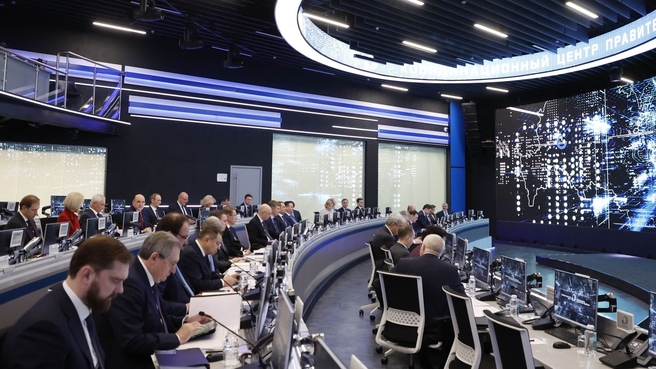Mikhail Mishustin: The Government is launching a series of themed strategic sessions. Their main purpose is to facilitate long-term economic development in the context of changes and hypothetical external challenges.
Mikhail Mishustin’s opening remarks:
Good afternoon, colleagues,
The Government is launching a series of themed strategic sessions. Their main purpose is to facilitate long-term economic development in the context of changes and hypothetical external challenges.
Today, we will sum up the results of implementing national projects and state programmes in 2022. These indicators have key significance for our work. They reflect current priorities and formulate a mid-term and short-term national development strategy. They also aim to achieve goals, specifically, national development goals that have been set by the President.
We will also discuss specific results, including the number of hospitals, roads and other important facilities that have been built. We will review areas where it is necessary to work more intensively or to implement additional measures.
We will also list high-priority aspects of our work throughout 2023 in the context of
current conditions and possible risks.
The past year presented us with new challenges. Unfriendly states have imposed restrictions and barriers on an unprecedented scale.
As a result of a series of prompt decisions, we have been able to strengthen the stability of our economy. Businesses have managed to reformat their production and logistics chains and to start exploring promising markets not only inside the country but also abroad.
The macroeconomic results of the year were better than expected. Let me remind you that the decrease in gross domestic product was just over 2 percent. Moreover, there were increases in entire sectors compared to previous years, especially those focused on domestic demand.
This was made possible, among other things, by the consistent implementation of our strategic plans. The national projects have already been updated and, as of 1 January last year, the entire mechanism of state programmes was restarted. They began to be implemented in a format based on the principles of project management. The introduction of digital solutions helped to increase the level of interaction between agencies.
We adopted priorities for each programme that defined public policy objectives in specific areas. In addition, we launched 42 strategic initiatives that not only enabled a number of important institutional changes, but also involved extra-budgetary sources for the country’s development.
We worked hard in all areas. Most of the national projects are close to 100 percent of the annual plan, and the cash execution is also close to the target.
The results for state programmes are slightly more modest in the open part. The cash position is about 98 percent, but the dynamics are positive. A year ago it was less. All in all, more than 19.5 trillion roubles have been spent on implementation. This amount is considerable, but the tasks involved were not easy either.
In his Address to the Federal Assembly, the President supported the intention of the regions to significantly expedite the renovation of social infrastructure, cultural and sports facilities, the resettlement of people living in emergency housing, and the comprehensive development of rural areas.
The funds for the national projects, which have been reserved in next year's federal budget, will now be available to the Russian regions through interest-free treasury loans. The relevant amendments to the legislation have been prepared.
Colleagues, we must not let up in the momentum we have gained. Huge resources are being allocated for the implementation of national projects and state programmes. Every rouble must be spent with maximum efficiency.













